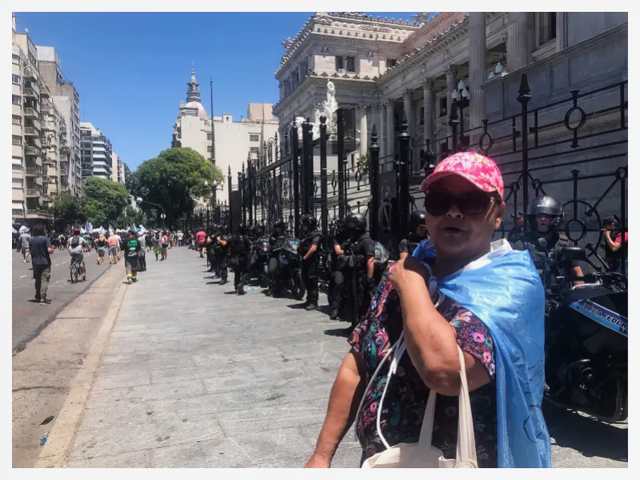Massive protests sweep Buenos Aires as workers unite against President Milei’s economic reforms. A historic demonstration challenges sweeping changes that risk exploitation, igniting a fierce debate on the future of Argentina’s economy.
Protests Against President Javier Milei Reforms
In an extraordinary display of discontent, Buenos Aires witnessed one of the largest demonstrations in recent history as crowds amassed outside Parliament, responding to a strike called by Argentina’s principal labor union, the CGT. Protesters, carrying placards declaring “The homeland is not for sale” and “Eating is not a privilege,” filled the streets, creating an atmosphere charged with determination.
The CGT, echoing the sentiments of the demonstrators, aimed to defend four decades of democracy and protect the homeland. Amid the cacophony of exploding firecrackers, drumbeats, and the rallying cry against President Milei’s reforms, CGT leader Hector Daer addressed the massive crowd, emphasizing the difference between campaigning and governance. He alluded to Milei’s symbolic use of a chainsaw during his campaign as an ominous forecast of severe public spending cuts.
The backdrop to this historic rally is President Milei’s bold announcement of sweeping reforms merely ten days after assuming office in December. These reforms, designed to alleviate financial strains on the economy, have triggered concerns and discontent among citizens. The changes include modifications to worker protections, removal of rent price ceilings, and lifting controls on specific consumer goods.
With poverty levels at a staggering 40 percent and annual inflation exceeding 200 percent due to decades of financial mismanagement, the Argentine population fears the repercussions of these economic overhauls.
The epicenter of the protest was Parliament, where lawmakers deliberated on Milei’s deregulation and economic reform package. Critics argue that these measures may leave workers vulnerable to exploitation and worsen living conditions for the already struggling population.
According to police estimates, around 80,000 people gathered in Buenos Aires, while protesters claimed a staggering half a million. Demonstrations rippled across various cities and towns, with smaller unions and civic groups joining forces with the CGT, pledging to protect hard-won worker and consumer rights.
The impact of the strike extended beyond the streets, affecting air travel as Aerolineas Argentinas canceled nearly 300 flights, resulting in a loss of approximately $2.5 million.
Security Minister Patricia Bullrich asserted that the country would not grind to a halt, emphasizing that the number of striking workers in Buenos Aires was around 40,000. The government remains steadfast in its commitment to the reform plan despite the unprecedented challenge.
In response to the strike, the government implemented countermeasures, setting up an anonymous hotline for reporting “threats and pressure” on workers avoiding work. The government also plans to deduct a day’s pay from each striking public servant and present unions with the bill for the police deployment during the protests.
President Milei’s reforms face significant opposition, with over 60 lawsuits challenging various aspects of the “mega decree.” A court has frozen one chapter dealing with labor reforms pending congressional review. Challenges to increase job probation periods, reduce dismissal compensation, and cut pregnancy leave underscore the contentious nature of Milei’s proposed changes.
The economic landscape, too, resists Milei’s attempts to boost export competitiveness through a substantial devaluation of the peso, with inflation swiftly eroding initial gains. As Argentina grapples with this wave of discontent, the nation stands at a crossroads, torn between the promise of economic revitalization and the fear of increased vulnerability for its citizens.
(AFP)

